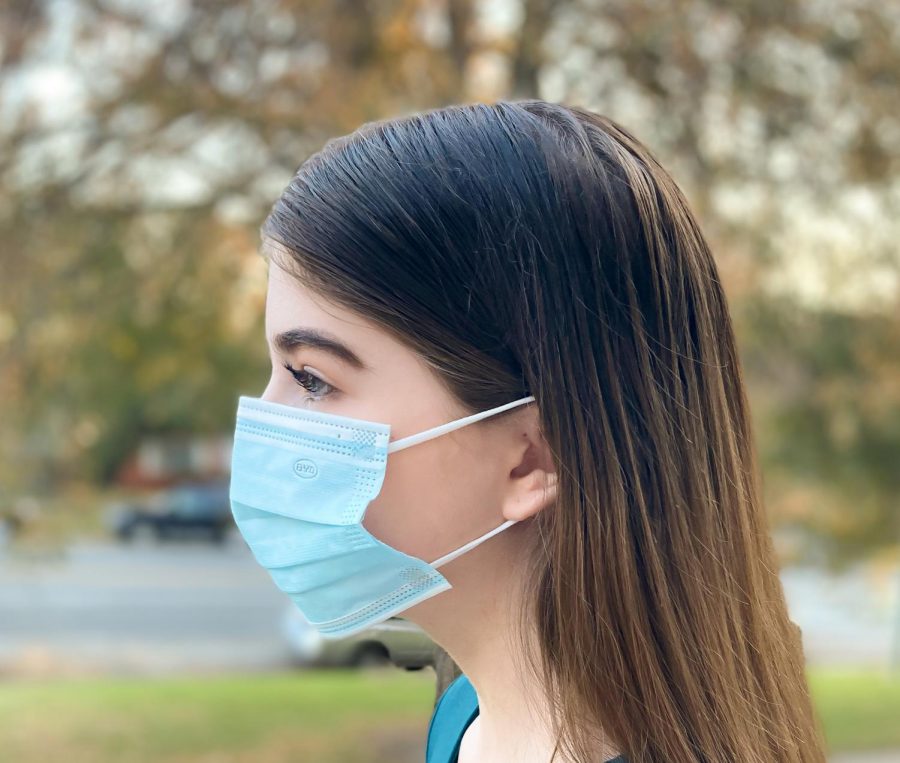Soter: Masks Are Saving Lives but Killing the Environment
U student Kristin Thompson poses for photograph. (Photo by Hailey Danielson | Daily Utah Chronicle)
November 4, 2021
I know you don’t want to, but we’ve got to talk about masks. Much to everyone’s dismay, the COVID-19 pandemic is not going away anytime soon. This is especially true in Utah where case counts soar, the death toll rises and ICU beds are full.
Masks may not be comfortable or convenient, but comfort or convenience is not their purpose. They are meant to keep us safe according to science. At times, that science is the fine line between life and death.
That said, climate change is also a matter of science. It’s also a matter of life and death. Since the beginning of the pandemic, disposable masks have had a dire effect on our environment. More than a year later, it’s time to shift the conversation from whether masks are still needed — because they are — to whether we’re using masks that are both environmentally and COVID-19 conscious.
Remember when disposable masks were impossible to find? Countries hoarded the few they had for their own citizens and broke the supply chain. Healthcare workers were forced to risk their lives by reusing PPE only to get up the next day to care for patients tormented by the very disease masks can help prevent.
Eventually, that changed. Tailors around the world make masks that are no longer disparately needed. Disposable masks are attainable, too attainable.
As of April 2021, 129 billion disposable masks were used around the globe every single month. And because disposable masks are just that — disposable — 3 million are being disposed of every minute. Think of the masks you see in the middle of the road and everywhere else. And those littered masks are clogging sewage systems.
According to National Geographic, “discarded PPE has clogged street drains from New York City to Nairobi.” Of course, those numbers have decreased since the summer months, when the CDC announced that vaccinated persons were no longer required to wear masks. But with winter not far away we can be sure that the number of monthly face masks used will increase yet again.
We’re not getting rid of masks anytime soon; we’re also not getting rid of trash — and God knows America has enough trash already. But there’s more to the story.
Disposable masks’ impact on the environment is especially harmful because of what’s in them. The surgical blue disposal masks that keep us safe are made of multiple plastic fibers. And while plastic can be recycled, face masks cannot. This is because masks aren’t only made of plastic fibers. They also have paper and polymers in them, making it impossible for masks to go into pure streams of recycling.
Because of those plastic fibers, disposable face masks won’t biodegrade for 450 years. Comparatively, plastic bags at the grocery store take 20 years to biodegrade. So those three million masks we’re throwing away every minute aren’t really gone, they’re just polluting a different environment, one you can’t see. That pollution is especially detrimental to our oceans.
One disposable face mask can release up to 173,000 microfibers in water over the span of a single day. It’s estimated that 75% of pandemic waste will end up in landfills or in our seas and oceans.
To put this into perspective, there are more disposable masks in the ocean than there are jellyfish. It was reported that 1.6 billion, nearly a whole month’s worth, of disposable masks, were found in the ocean by the end of 2020.
As the masks degrade, they turn into smaller particles, poisoning marine life. Often, marine life will choke on masks or even entangle themselves in them before disposable masks even begin their biodegrading process.
The impact face masks have on land animals can be fatal as well. For example, birds frequently get tangled in the mask loops, which has resulted in death.
There are many solutions researchers and scientists are designing. Some want to turn disposable masks into roads, while others want to create a reusable N95 mask that can be cleaned the same way a cotton one is, but those solutions aren’t ready. Until a solution is set in place, wear reusable masks with reusable filters, double up if it makes you feel better and most importantly dispose of your masks in the right way — the garbage.
The pandemic will end but not until we all start working together. Right now, we’re responding to one global disaster by catalyzing another. That’s not sustainable. Be conscious about your mask usage, continue to wear a mask, stay inside when you’re sick and get your vaccine. Let’s do this together.












